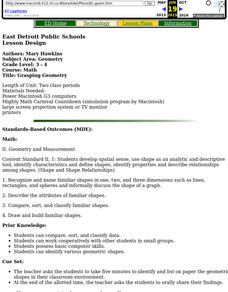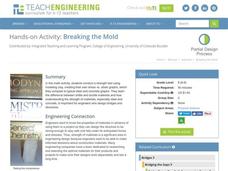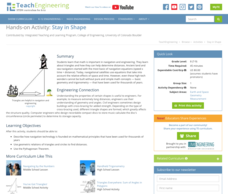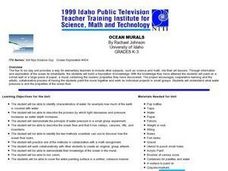Pennsylvania Department of Education
What Balances?
Students explore another meaning of subtraction as it pertains to the inverse of addition. In this what balances lesson, students identify the concept of subtraction as a balance. Students use subtraction facts to generate addition...
Curated OER
Teaching The Scientific Method Using Adhesives
Students use the six step scientific method to experiment with the differences in adhesives. Students test for tack, shear, and peel in these activities.
Curated OER
Grasping Geometry
Students investigate geometric shapes in their environment, make a geometric design, and write paragraphs describing the design.
Curated OER
Using the Variation Approach
Students explore and explain geometrical applications, and how to apply these applications to real life.
Curated OER
The Demise of Copper's Trading Power
Eighth graders evaluate statistical equations. They examine data from archaeologists at Jamestown, complete statistical equations using the sets of data, and graph the results.
Curated OER
Computers Can Only Add
Students explore using mathematics to solve problems in base two. After a teacher demonstration of using base two to write numbers. students model similar problems to explore the concept of number systems in different bases. To increase...
Curated OER
Mathematical Relationships
Students practice graphing a linear equation and a parabolic equation. They work cooperatively to select numbers, including fractions, which they will put into ordered pairs. Students explain their process to the class, discussing what...
Alabama Learning Exchange
Explore the Transformations of Linear and Absolute Value Functions Using Graphing Utilities
Students explore the concept of transformations. For this transformation lesson, students use an applet that is an interactive absolute value graph applet. Students manipulate the applet to examine the change in the function...
Curated OER
It's a Party! Solving Multi-step Equations
Students explore the concept of multi-step equations. In the multi-step equation lesson, students solve equations by the 'party method'. Students make a flip book that shows the steps in solving multi-step equations.
Curated OER
The X-33 and the X-38
Students explore the relationships among the lengths, areas, and volumes of similar solids. They also discover what effect doubling the dimensions of a figure has on the resulting area.
Curated OER
Multiplicative Sequences
Students investigate the concepts related to the practice of multiplication facts. They look for number patterns in order to create an algorithm in order to find the correct sequencing of number patterning. The solutions are then...
Curated OER
Major Organic Acids in Fruits
Students investigate the organic acids present in a variety of juices. For this organic acids lesson plan, students read about the effects of organic acids in juices. They use paper chromatography to separate out the acids present in a...
Teach Engineering
Breaking the Mold
A little too much strain could cause a lot of stress. Groups conduct a strength test on clay. Using books as weights, pupils measure the compression of clay columns and calculate the associated strain and stress. Teams record their...
Curated OER
Silly Semi-Solids
Students create a polymer out of glue, water, and borax. They discuss the resulting substance and perform several experiments with it.
Teach Engineering
Aerogels in Action
Model an oil spill cleanup. An engaging engineering lesson has groups using aerogels to simulate an oil spill cleanup (vegetable oil in water). Along the way, they learn about nanotechnology and hydrophilia/hydrophobia.
Teach Engineering
Messin' with Mixtures
Do you separate your trail mix before eating it? Then you've been separating mixtures your whole life! Scholars model a contaminated soil sample using trail mix and estimate the percentage of each component. They consider how to clean up...
Teach Engineering
Stay in Shape
Using their knowledge of right triangles, pupils find out how far a ship is from a light house. Class members determine how far around the world a ship would be sailing at a constant speed.
Teach Engineering
Bouncing Balls
How high will it bounce? Groups determine the height different balls bounce off of different surfaces. By performing the necessary calculations, they determine the initial and final momentum of the balls. The included worksheet provides...
Teach Engineering
Light Intensity Lab
Let there be light. The last installment of a seven-part series has pupils conduct an experiment on light attenuation through different numbers of transparency sheets. They then relate the results back to how X-rays measure bone density.
Curated OER
Chemical Wonders
Students read about and discuss how chemical engineers use different states of matter to create substances. In this chemical engineering lesson plan, students also give examples of the 3 kinds of matter.
Teach Engineering
Solenoids
Metal slinkies, coils of wire, magnetic fields, and MRIs. To determine the safety hazards of MRI machines, class members use the provided formula to calculate the magnetic field along the axis of the solenoid.
Teach Engineering
Magnetic Fields Matter
Help your young scientists learn which materials are affected by magnetic fields with an activity that presents the information about different types of materials — diamagnetic, paramagnetic, and ferromagnetic — and their interaction...
Curated OER
Bone Fractures and Engineering
Learners examine bone fractures and the role that engineers play in repairing them. In this biomedical engineering lesson students describe the factors that engineers consider when designing devices.
Curated OER
Ocean Murals
Students identify characteristics of water. They describe the process by which light decreases and pressure increases as water depth increases. They demonstrate the principle of water pressure in a small group experiment.

























